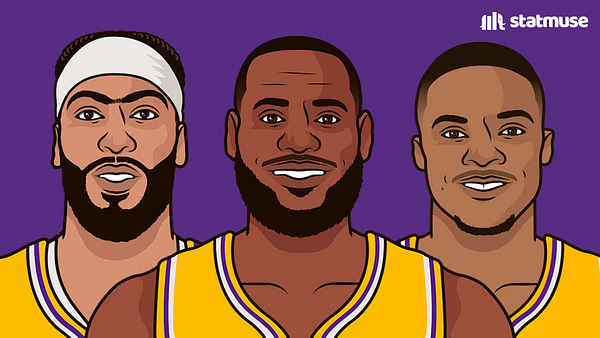When 0-3 feels like 0-30
Philadelphia was the NBA’s most disappointing team during the season’s opening week, but the Lakers’ winless start comes with so many more layers. We dig into them
When the Los Angeles Lakers awarded a contract extension to Rob Pelinka months ago, they didn't announce the move like they did when Pelinka received an extension in January 2020.
You can safely presume this was not an accidental oversight.
The Lakers surely knew that a renewed commitment to Pelinka in the wake of the most underachieving season in team history, especially a four-year extension, was unlikely to be received warmly by the denizens of Lakerland. So the move stayed under wraps until my Turner Sports pal Chris Haynes revealed it on Oct. 8.
Pelinka, not surprisingly, has been derided on a daily basis ever since.
The Lakers, to be clear, do not rank as the most disappointing team of the NBA's opening week — no chance after a presumed title contender in Philadelphia dropped from preseason NBA darlings to 0-3 with a home loss Saturday night to tanking San Antonio.
The Lakers' own 0-3 launch has nonetheless been so noisy and dispiriting that it has managed to train intense heat and scrutiny on an executive who would figure to have a copious amount of job security after landing a new contract through the 2025-26 season.
Quite a feat for The Gang That Couldn’t Shoot Straight.


What makes this team so unique is that I can't remember another star-laden squad in my 29 previous seasons of doing this job that inspires pundits and the public to collectively predict doom in advance and then, on cue, said team struggles precisely as predicted. Or as my fellow SubstackerTom Ziller wrote the other day: "... Everything we thought was wrong with the L.A. Lakers is in fact wrong with the L.A. Lakers."
It was widely declared after the Lakers officially acquired Russell Westbrook in July 2021 that a star trio featuring the addition of a ball-dominant Westbrook to a ball-dominant LeBron James and Anthony Davis would never function properly.
It was said just as loudly throughout this past offseason that trying to bring Westbrook back for a second season to reintegrate him with these Lakers, after management so clearly tried for months to trade him, had the capacity to be just as disastrous given the team's corresponding lack of shooting and depth.
If you really want to rewind, we could also revisit how many naysayers warned the Lakers that they were giving up too much in the July 2019 trade to acquire Davis from New Orleans. The most common refrain heard in the Lakers' defense espoused that whatever price was paid for Davis was ultimately worth it because it delivered a championship. A new Stein Line poll might be in order in my next This Week In Basketball column to determine how many fans and observers still feel that way about a trade that has thus far delivered one championship in the Walt Disney World bubble, one first-round exit and one 33-49 campaign ... and now appears to have the potential to put the Pelicans in the Victor Wembanyama lottery chase if (very early) current form holds because New Orleans has the right to swap picks with the Lakers in June thanks to the AD blockbuster.
Let's clarify a few more things about the 0-3 team that Daryl Morey, Doc Rivers and the rest of the 76ers' organization is undoubtedly grateful to see given the Lakers' propensity to soak up most of the NBA oxygen in times of distress:
The reason they haven't traded Westbrook yet should be clear.
It's not merely the Lakers' reluctance to attach their highly coveted future first-round draft picks in 2027 and 2029 to Westbrook's $47 million expiring salary in fear that the trades available today won't move them into the upper reaches of the Western Conference standings.
It's the fear of compounding the






